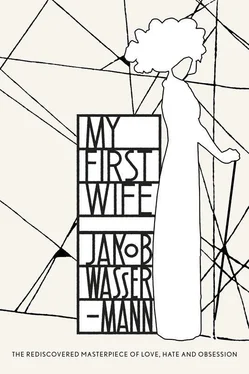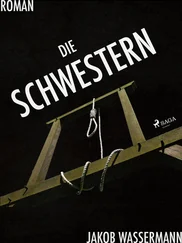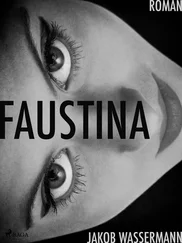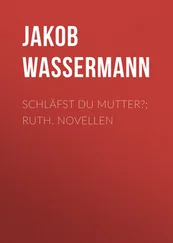I GET POCKET MONEY
Baby clothes need buying. The rent needs paying. The servants need paying. I need a new suit for the winter. Ganna needs a coat. The interest isn’t enough, we need — Ganna’s nightmare — to attack the capital. We need to sell some of the tamper-proofed securities. Ganna’s horror. The holy awe of money in the bank has by now infected me. There is nothing more odious than money and the spirit of money. On the first of the month I toddle along to the bank to take out the money we need for the household. I feel like a thief doing it. The cashier at the desk, a gaunt man with gold-rimmed spectacles, is old Mevis’s viceroy on earth; he is certain to subject me to a thorough cross-questioning. A man who attacks his capital will stop at nothing. Ganna’s tiny hands clutch the bank account like a legal scroll. The cashier lets the notes flutter over the marble till, the capital swishes. I count them shyly, and when I pack them away in my wallet I feel I have outwitted the man at the till and am about to leg it. I leave with the footfall of a fraud. I have no peace till I have handed the money into Ganna’s safe keeping, every last penny of it. Ganna notes it down, Ganna calculates, Ganna doles out my pocket money. Yes, my pocket money, as if I’d been a boarding school pupil. It seems perfectly natural to me. What would a man need money for if he has board and lodgings? I have a good mind to say that to the man at the counter when I next visit. It may make him take a milder view of me.
NOT EVERYTHING IS AS IT SHOULD BE
‘Can’t we eat soon?’ comes my dejected question as the grandfather clock strikes two in the yellow barn. ‘In a minute, Alexander,’ Ganna breathes back anxiously, one of the many Gannas, ‘in a minute.’ And then see what the messy ‘maid of all work’ dishes up! Things that deny their nature. Meat that looks like charcoal. Cakes that look like book bindings. Soups of which all that can be said in their favour is that they are steaming. All of it produced by gigantic effort, with Ganna’s endless trouble. Ganna’s trouble is a chapter on its own. Imagine a great surge of energy followed by nothing, nothing at all, that disappears without trace. An almost scientific thoroughness, the most serious commitment, and the result more or less as if someone had taken a sledgehammer to a fly on a windowpane. It’s all precisely calculated, it’s a radical procedure, but the windowpane suffers, as anyone could have predicted except Ganna. Ganna doesn’t understand. With her apron tied on she stands by the stove, stirs the batter in the pan, and open on the sideboard are Hölderlin’s poems, which she sneaks a look at. When the batter at the bottom of the pan is charred, she can’t help herself and scolds the maid. I see the real problem and tell her: ‘But Ganna, it’s not possible to read Hölderlin and cook pancakes at one and the same time. You have to decide which one you’re doing.’ Ganna concedes that, but it’s difficult for her, she’s so riven by the claims of utility and the spirit. You could say she sweats with effort. In her desire to please me nothing is too much trouble, no inconvenience is too great. But everything falls down because of the excess of fuss. Whenever she tries to see that I am left in peace for my work, she manages to knock over the metaphorical chair. The little domestic devils have it in for her. Her burning ambition melts everything she reaches out for. It’s interesting, even at times breathtaking, but it’s not what one could call a peaceful existence. It feels like being on board a ship that keeps being clumsily steered into the teeth of the gale.
And then there are the servants. The first maid stayed for six days, the second lasted just two, the third fourteen, and none of her successors was with us for longer than three weeks. Ganna is at a loss to explain it; I too am puzzled. Only gradually I come to understand. I discover that under Ganna’s regime any flaw in a human being turns into a vice. It’s quite something. If a girl comes into our house with a sweet tooth, she leaves it as a thief. An untidy girl becomes a whirlwind. Since Ganna doesn’t have a clue about how you make a bed or polish a doorknob, her orders are heard with quiet derision. She hasn’t the least idea how long it takes to do anything. Either she demands the impossible, or else she’s diddled. She doesn’t understand common people or their speech. Her somewhat pretentious idiom leaves people in the dark and they are suspicious of her. First of all she’s sugar-sweet and then without any sort of transition she can become crude. The bourgeois conceit of the Mevis girls and her own literary education keep her from viewing people working for her as beings like herself. Sometimes she would like to, but it’s more than she can do. At the slightest difference of opinion she flies off the handle and her eyes throw sparks. In the early days I am able to calm her down, but later her rage will turn on me, too. I am forced to leave her to it, otherwise the domestic strife just gets too exhausting.
There was one girl called Resi who managed to twist Ganna round her little finger, by the simple expedient of flattering her mercilessly; one night she plundered the linen cupboard and vanished. There was a Kathy, who had a string of lovers, and if Ganna ever caught one in her kitchen there would be a terrible yelling match on both sides. There was a Pepi, who was picked up by the police on suspicion of arson. There was a Hannah, who turned out to be in the advanced stages of syphilis; when we let her go her fellow sneaked into the house at night and threatened me with a revolver. There were temps who were as dirty and uncouth as if we’d got them from a holding cell. There were kitchen maids who made off with flour, rice and preserves under their skirts. It smells of burned milk all morning. Girls come, girls go. Ganna spends hours at domestic agencies. Come the evening she’s beaming: she’s come up with a ‘pearl’. A couple of days later the pearl turns out to be just a rotten pea. Ganna feels discouraged, and I need to comfort her. Every now and again one of the sisters turns up, to show some solidarity. With a little admixture of Schadenfreude, admittedly. They are pessimistic about the future. Ganna might know about books, their expressions say, but she doesn’t have a clue about life.
THE HERMITAGE
When Ganna started having her contractions, I fled. I know it’s a shameful confession to make, but I had had too much of home. I spent the afternoon with the big cats in Schönbrunn. Something cold and slick had got hold of me. I had heard Ganna’s screams. Even her screams were louder and wilder than other women’s. Her nature put up one hell of a fight against the pain. What, I, Ganna, am expected to suffer?! I, a Mevis, Alexander Herzog’s wife, am expected to suffer?! Nothing helped, she had to suffer. I suffered with her, but I couldn’t stand to witness it. Not out of the usual male cowardice and guilt, but because it wasn’t through passion that I had brought her suffering.
When I got home, there was something dark and hairy in the swaddling bands. It was a son — Ganna had been right. (I couldn’t see any resemblance to Narcissus, though.) In a pristine bed, her russet hair tied up under a blue cloth, Ganna with a blissful exhausted smile held out its little hand to me. I was deeply moved. ‘Don’t you think he’s beautiful?’ she asked. ‘Yes, very nice,’ I replied, and probably I looked a bit foolish as I said so. When the baby was put to her bosom, her eyes welled up. It was as though this particular show had never happened before, no woman had ever given birth before, or breast-fed her baby. Well, I said to myself, there are some people who experience life in a particularly primal way. We called the hairy amphibian Ferdinand, Ferry for short. He did turn out to be an uncommonly attractive child; here too Ganna managed to get her way.
Читать дальше







![Jakob Wassermann - Issue Does Not Exist],errors:{](/books/585068/jakob-wassermann-issue-does-not-exist-errors-thumb.webp)




